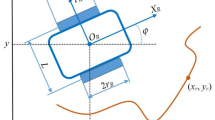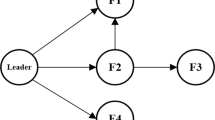Abstract
This paper proposes a novel cooperative control method based on cyclic pursuit algorithm and fuzzy control idea, to accomplish reconfiguration of multi-agent formation in 3D space. The idea is to use nonlinear cyclic pursuit control within the formation’s longitudinal motion plane, and use fuzzy control-based piecewise proportional derivative (PD) controller for cooperative control in the normal direction of motion. It is called cyclic pursuit-fuzzy PD control method. The control process is divided into different fuzzy sets, for which different control coefficients are set. The paper will present two control strategies to comparatively analyze the performances of control method. As the results demonstrate, the proposed method improves the performance and accuracy of formation reconfiguration control, avoids the inter-member collisions and enhances the system stability.
















Similar content being viewed by others
References
Ali, F., Maryam, Z., Mohammad, D.: High order robust fast finite time containment control for multi-agent systems. Trans. Inst. Meas. Control 42(3), 528–542 (2020)
Lee, S., Kim, Y.: Distributed persistent coverage control and performance evaluation of multi-agent system. Aeronaut. J. 123(1268), 1701–1723 (2019)
Iqbal, M., Ngo, T.D., Leth, J.: A generalized hierarchical nearly cyclic pursuit for the leader-following consensus problem in multi-agent systems. Trans. Inst. Meas. Control 40(5), 1529–1537 (2018)
Daingade, S., Sinha, A.: Nonlinear cyclic pursuit based cooperative target tracking. Distributed autonomous robotic systems, springer tracts in advanced. Robotics 104, 17–30 (2014)
Galib, R., Sinha, A.: A study of balanced circular formation under deviated cyclic pursuit strategy. IFAC. 48(5), 41–46 (2015)
Daingade, S., Sinha, A., Borkar, A.V., et al.: A variant of cyclic pursuit for target tracking applications: theory and implementation. Autonom. Robot 40, 669–686 (2016)
L. L. Ma and N. Hovakimyan. Cooperative target tracking in balanced circular formation: Multiple UAVs tracking a ground vehicle. In: Proceedings of the American control conference, pp. 5386–5391, 2013
Yang, X.X., Yang, T., Yang, H.X., et al.: Cyclic pursuit algorithm for distributed formation control of multi-agent systems. J. Central South Univ. 45(2), 450–456 (2014)
Yang, X.X., Yang, T., Zhang, W.H.: Rendezvous control of spacecraft formation based on cyclic pursuit algorithm. J. Natl. Univ. Defense Technol. 36(1), 1–5 (2014)
Luo, J., Zhou, L., Jiang, Q., et al.: 6 DOF coordinated control using cyclic pursuit for space formation. J. Astronaut. 38(2), 166–175 (2017)
Xia, Y., Sun, H.: Circular formation control of a ship fleet based on the cyclic pursuit strategy. J. Xiamen Univ. 54(1), 93–98 (2015)
T. Yang, Z. D. Hu and L. B. Yang. Cooperative control for satellite formation reconfiguration via cyclic pursuit strategy. Adv. Mater. Res. pp. 1153-1159, 2014
Biswadip, D., Galloway, K.: Collective motion under beacon-referenced cyclic pursuit. Automatica 91, 17–26 (2018)
Y. Wang, H. R. Karimi, H. K. Lam, and H. Yan. Fuzzy output tracking control and filtering for nonlinear discrete-time descriptor systems under unreliable communication links. In: IEEE Transactions on Cybernetics, to be published, 2019
Wei, Y., Qiu, J., Shi, P., et al.: A piecewise-Markovian Lyapunov approach to reliable output feedback control for fuzzy-affine systems with time delays and actuator faults. IEEE Transac. Cybernet. 48(9), 2723–2735 (2018)
Wu, Z.T., Karimi, H.R., Dang, C.Y.: An approximation algorithm for graph partitioning via deterministic annealing neural network. Neural Netw. 117, 191–200 (2019)
Zheng, Y.B., Xi, P.X., Wang, L.L., et al.: A multi-agent formation control and obstacle avoidance method based on fuzzy artificial potential field method. Comput. Eng. Sci. 41(8), 1504–1511 (2019)
Y. Wang, B. Jiang and Z. Wu, et al. Adaptive sliding mode fault-tolerant fuzzy tracking control with application to unmanned marine vehicles. In: IEEE transactions on systems man, and cybernetics: systems, to be published, 2020
Wang, Y., Zhou, W., Luo, J., et al.: Reliable intelligent path following control for a robotic airship against sensor faults. IEEE/ASME Trans. Mechatron. 24(6), 2572–2582 (2019)
Wang, Y., Yang, X., Yan, H.: Reliable fuzzy tracking control of near-space hypersonic vehicle using aperiodic measurement information. IEEE Trans. Industr. Electron. 66(12), 9439–9447 (2019)
L. Jiao, P. F. Shi, W. L. Wei. Research on fuzzy PID control of UAV formation flight. Comput. Simul. 32(9), 2015
Hong, X., Sheng, X.H.: Proportional differential control for lane following for wheeled robot based on fuzzy adjusting. J. Beijing Jiaotong Univ. 28(4), 80–83 (2004)
T. Yang. Research on pursuit theory and its application to space missions. Doctor thesis, National University of Defense Technology, 2010
Z. T. Wu, B. P. Jiang, H. R. Karimi. A logarithmic descent direction algorithm for the quadratic knapsack problem. Appl. Math. Comput. 369, 2020
J. L. Ramirez. New decentralized algorithms for spacecraft formation control based on a cyclic approach. Doctor thesis, Cambridge, Massachusetts Institute of Technology, 2010
Acknowledgements
This work is partially supported by Fund of Doctor Research Project by Shenyang Aerospace University under Grant 18YB12.
Author information
Authors and Affiliations
Corresponding author
Rights and permissions
About this article
Cite this article
Yang, H., Wang, Y. Cyclic Pursuit-Fuzzy PD Control Method for Multi-agent Formation Control in 3D Space. Int. J. Fuzzy Syst. 23, 1904–1913 (2021). https://doi.org/10.1007/s40815-020-00892-z
Received:
Revised:
Accepted:
Published:
Issue Date:
DOI: https://doi.org/10.1007/s40815-020-00892-z




